Corporate Governance Failures: Case Studies, Theories, and Solutions
VerifiedAdded on 2022/08/18
|15
|3975
|23
Report
AI Summary
This report examines corporate governance failures through the lens of three major scandals: the Toshiba accounting scandal, the Bernie Madoff scandal, and the Volkswagen scandal. It delves into the reasons behind these failures, including the pursuit of personal interests by managers, ineffective governance mechanisms, and poor internal controls. The report analyzes each case study, highlighting the key players, the laws and codes breached, and the impact on stakeholders. It discusses relevant corporate governance theories, such as agency theory and stewardship theory, to explain the underlying issues. The report also explores the consequences of these failures, including financial losses, loss of investor confidence, and reputational damage. Finally, it proposes potential solutions, such as stricter internal controls, improved auditing practices, and adherence to ethical principles, to prevent future corporate governance failures and restore trust in corporations.

Corporate Governance
Running Head: COMMERCIAL LAW 0
rr
3 / 2 1 / 2 0 2 0
Student’s Name
Running Head: COMMERCIAL LAW 0
rr
3 / 2 1 / 2 0 2 0
Student’s Name
Paraphrase This Document
Need a fresh take? Get an instant paraphrase of this document with our AI Paraphraser
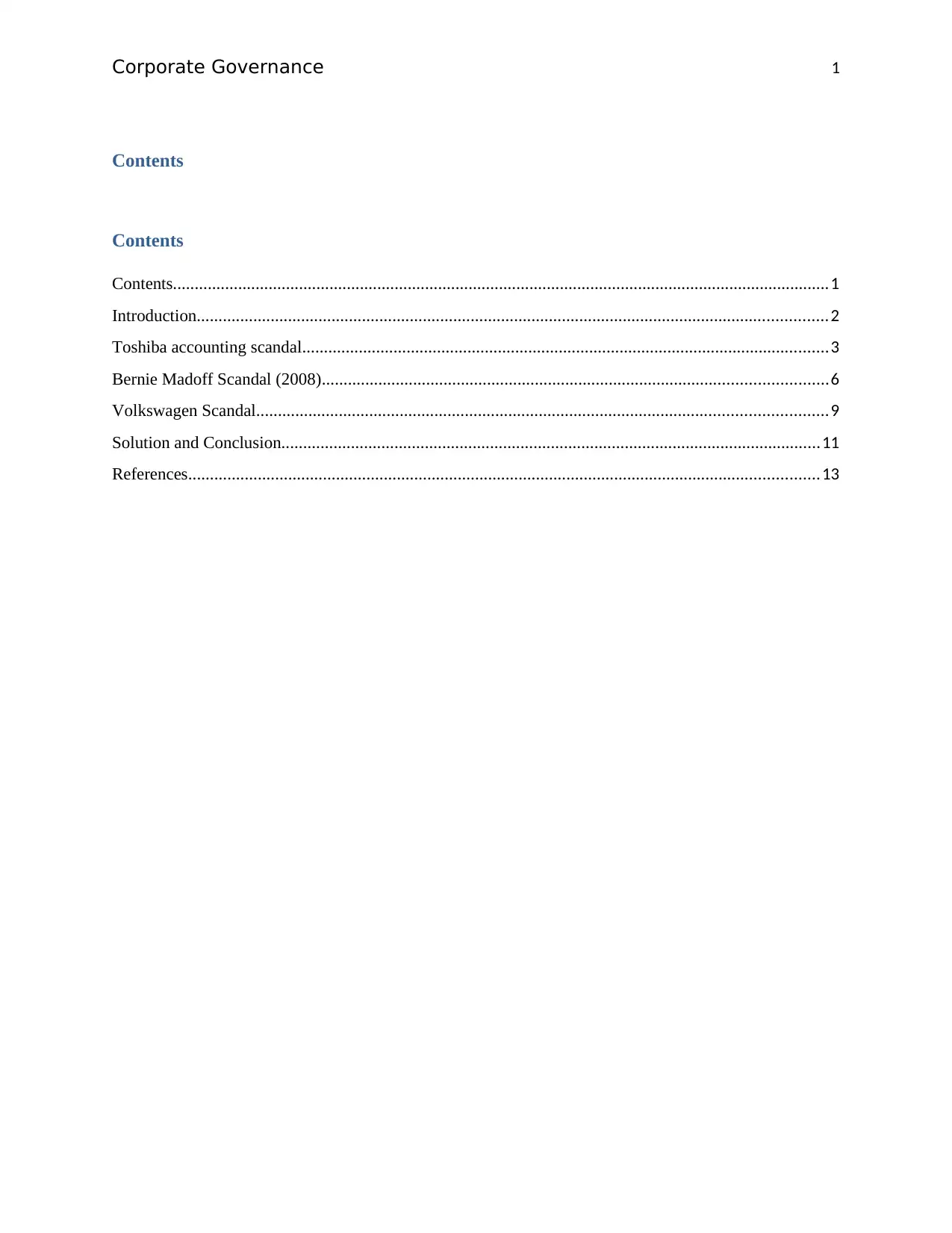
Corporate Governance 1
Contents
Contents
Contents.......................................................................................................................................................1
Introduction.................................................................................................................................................2
Toshiba accounting scandal.........................................................................................................................3
Bernie Madoff Scandal (2008)....................................................................................................................6
Volkswagen Scandal...................................................................................................................................9
Solution and Conclusion............................................................................................................................11
References.................................................................................................................................................13
Contents
Contents
Contents.......................................................................................................................................................1
Introduction.................................................................................................................................................2
Toshiba accounting scandal.........................................................................................................................3
Bernie Madoff Scandal (2008)....................................................................................................................6
Volkswagen Scandal...................................................................................................................................9
Solution and Conclusion............................................................................................................................11
References.................................................................................................................................................13
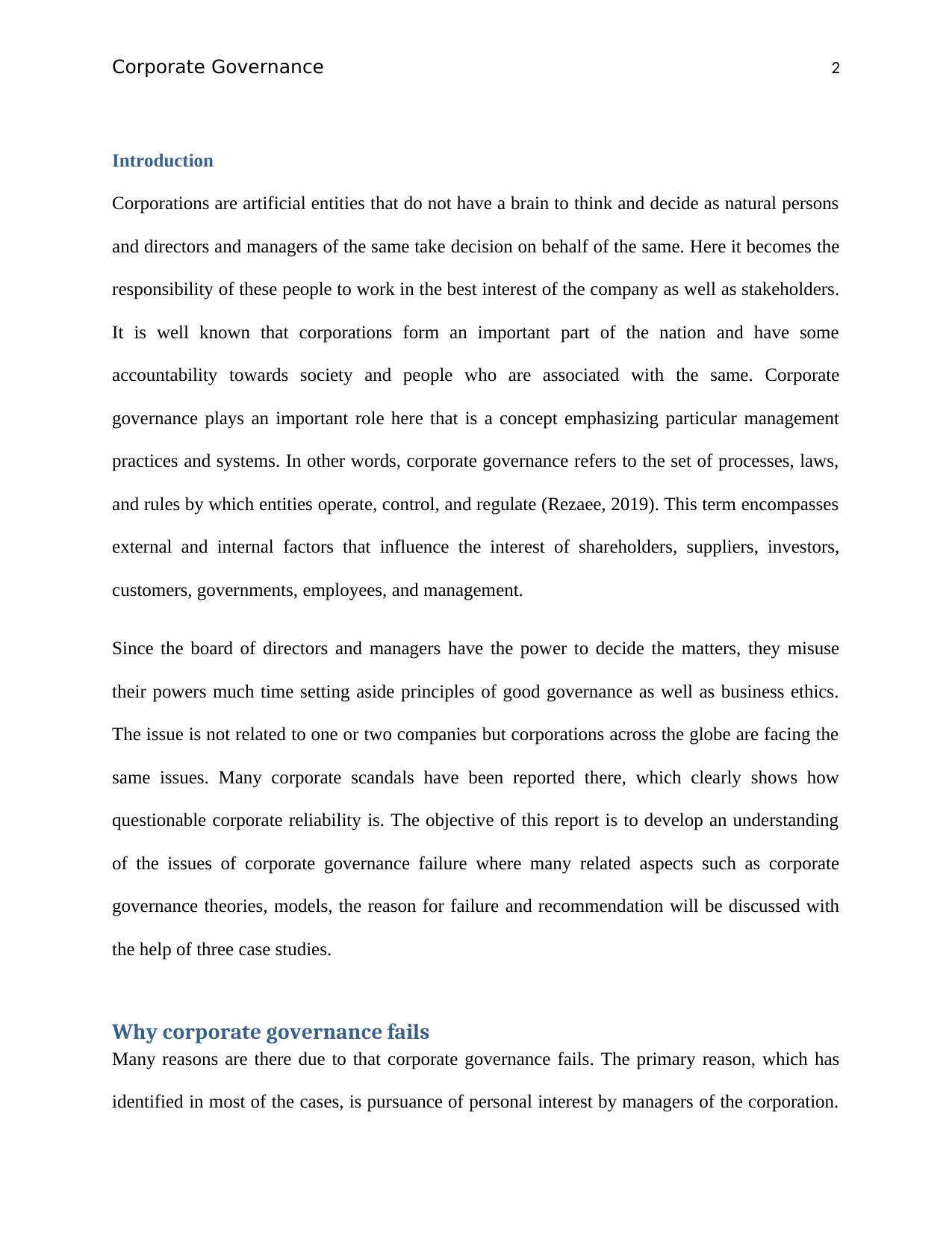
Corporate Governance 2
Introduction
Corporations are artificial entities that do not have a brain to think and decide as natural persons
and directors and managers of the same take decision on behalf of the same. Here it becomes the
responsibility of these people to work in the best interest of the company as well as stakeholders.
It is well known that corporations form an important part of the nation and have some
accountability towards society and people who are associated with the same. Corporate
governance plays an important role here that is a concept emphasizing particular management
practices and systems. In other words, corporate governance refers to the set of processes, laws,
and rules by which entities operate, control, and regulate (Rezaee, 2019). This term encompasses
external and internal factors that influence the interest of shareholders, suppliers, investors,
customers, governments, employees, and management.
Since the board of directors and managers have the power to decide the matters, they misuse
their powers much time setting aside principles of good governance as well as business ethics.
The issue is not related to one or two companies but corporations across the globe are facing the
same issues. Many corporate scandals have been reported there, which clearly shows how
questionable corporate reliability is. The objective of this report is to develop an understanding
of the issues of corporate governance failure where many related aspects such as corporate
governance theories, models, the reason for failure and recommendation will be discussed with
the help of three case studies.
Why corporate governance fails
Many reasons are there due to that corporate governance fails. The primary reason, which has
identified in most of the cases, is pursuance of personal interest by managers of the corporation.
Introduction
Corporations are artificial entities that do not have a brain to think and decide as natural persons
and directors and managers of the same take decision on behalf of the same. Here it becomes the
responsibility of these people to work in the best interest of the company as well as stakeholders.
It is well known that corporations form an important part of the nation and have some
accountability towards society and people who are associated with the same. Corporate
governance plays an important role here that is a concept emphasizing particular management
practices and systems. In other words, corporate governance refers to the set of processes, laws,
and rules by which entities operate, control, and regulate (Rezaee, 2019). This term encompasses
external and internal factors that influence the interest of shareholders, suppliers, investors,
customers, governments, employees, and management.
Since the board of directors and managers have the power to decide the matters, they misuse
their powers much time setting aside principles of good governance as well as business ethics.
The issue is not related to one or two companies but corporations across the globe are facing the
same issues. Many corporate scandals have been reported there, which clearly shows how
questionable corporate reliability is. The objective of this report is to develop an understanding
of the issues of corporate governance failure where many related aspects such as corporate
governance theories, models, the reason for failure and recommendation will be discussed with
the help of three case studies.
Why corporate governance fails
Many reasons are there due to that corporate governance fails. The primary reason, which has
identified in most of the cases, is pursuance of personal interest by managers of the corporation.
⊘ This is a preview!⊘
Do you want full access?
Subscribe today to unlock all pages.

Trusted by 1+ million students worldwide
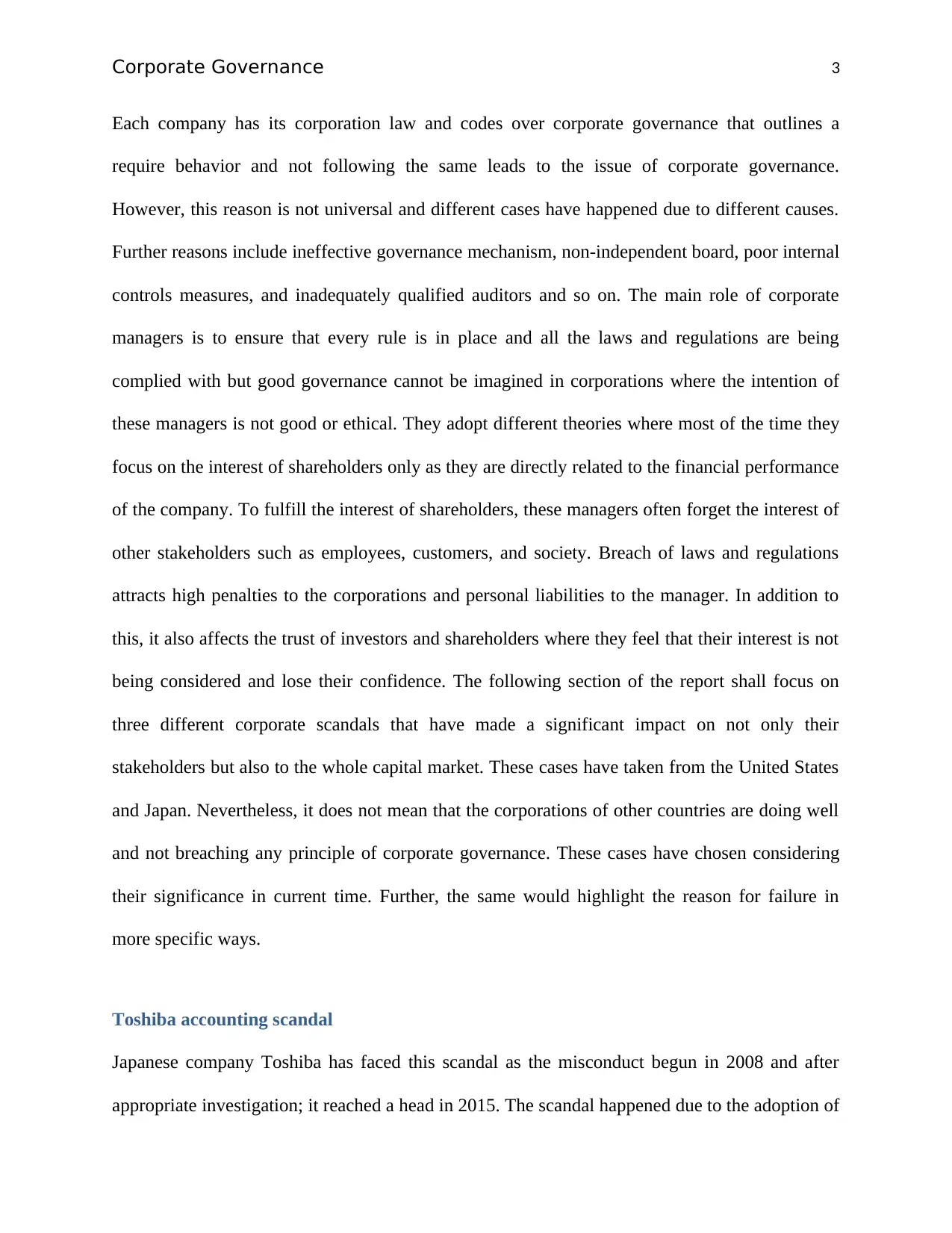
Corporate Governance 3
Each company has its corporation law and codes over corporate governance that outlines a
require behavior and not following the same leads to the issue of corporate governance.
However, this reason is not universal and different cases have happened due to different causes.
Further reasons include ineffective governance mechanism, non-independent board, poor internal
controls measures, and inadequately qualified auditors and so on. The main role of corporate
managers is to ensure that every rule is in place and all the laws and regulations are being
complied with but good governance cannot be imagined in corporations where the intention of
these managers is not good or ethical. They adopt different theories where most of the time they
focus on the interest of shareholders only as they are directly related to the financial performance
of the company. To fulfill the interest of shareholders, these managers often forget the interest of
other stakeholders such as employees, customers, and society. Breach of laws and regulations
attracts high penalties to the corporations and personal liabilities to the manager. In addition to
this, it also affects the trust of investors and shareholders where they feel that their interest is not
being considered and lose their confidence. The following section of the report shall focus on
three different corporate scandals that have made a significant impact on not only their
stakeholders but also to the whole capital market. These cases have taken from the United States
and Japan. Nevertheless, it does not mean that the corporations of other countries are doing well
and not breaching any principle of corporate governance. These cases have chosen considering
their significance in current time. Further, the same would highlight the reason for failure in
more specific ways.
Toshiba accounting scandal
Japanese company Toshiba has faced this scandal as the misconduct begun in 2008 and after
appropriate investigation; it reached a head in 2015. The scandal happened due to the adoption of
Each company has its corporation law and codes over corporate governance that outlines a
require behavior and not following the same leads to the issue of corporate governance.
However, this reason is not universal and different cases have happened due to different causes.
Further reasons include ineffective governance mechanism, non-independent board, poor internal
controls measures, and inadequately qualified auditors and so on. The main role of corporate
managers is to ensure that every rule is in place and all the laws and regulations are being
complied with but good governance cannot be imagined in corporations where the intention of
these managers is not good or ethical. They adopt different theories where most of the time they
focus on the interest of shareholders only as they are directly related to the financial performance
of the company. To fulfill the interest of shareholders, these managers often forget the interest of
other stakeholders such as employees, customers, and society. Breach of laws and regulations
attracts high penalties to the corporations and personal liabilities to the manager. In addition to
this, it also affects the trust of investors and shareholders where they feel that their interest is not
being considered and lose their confidence. The following section of the report shall focus on
three different corporate scandals that have made a significant impact on not only their
stakeholders but also to the whole capital market. These cases have taken from the United States
and Japan. Nevertheless, it does not mean that the corporations of other countries are doing well
and not breaching any principle of corporate governance. These cases have chosen considering
their significance in current time. Further, the same would highlight the reason for failure in
more specific ways.
Toshiba accounting scandal
Japanese company Toshiba has faced this scandal as the misconduct begun in 2008 and after
appropriate investigation; it reached a head in 2015. The scandal happened due to the adoption of
Paraphrase This Document
Need a fresh take? Get an instant paraphrase of this document with our AI Paraphraser
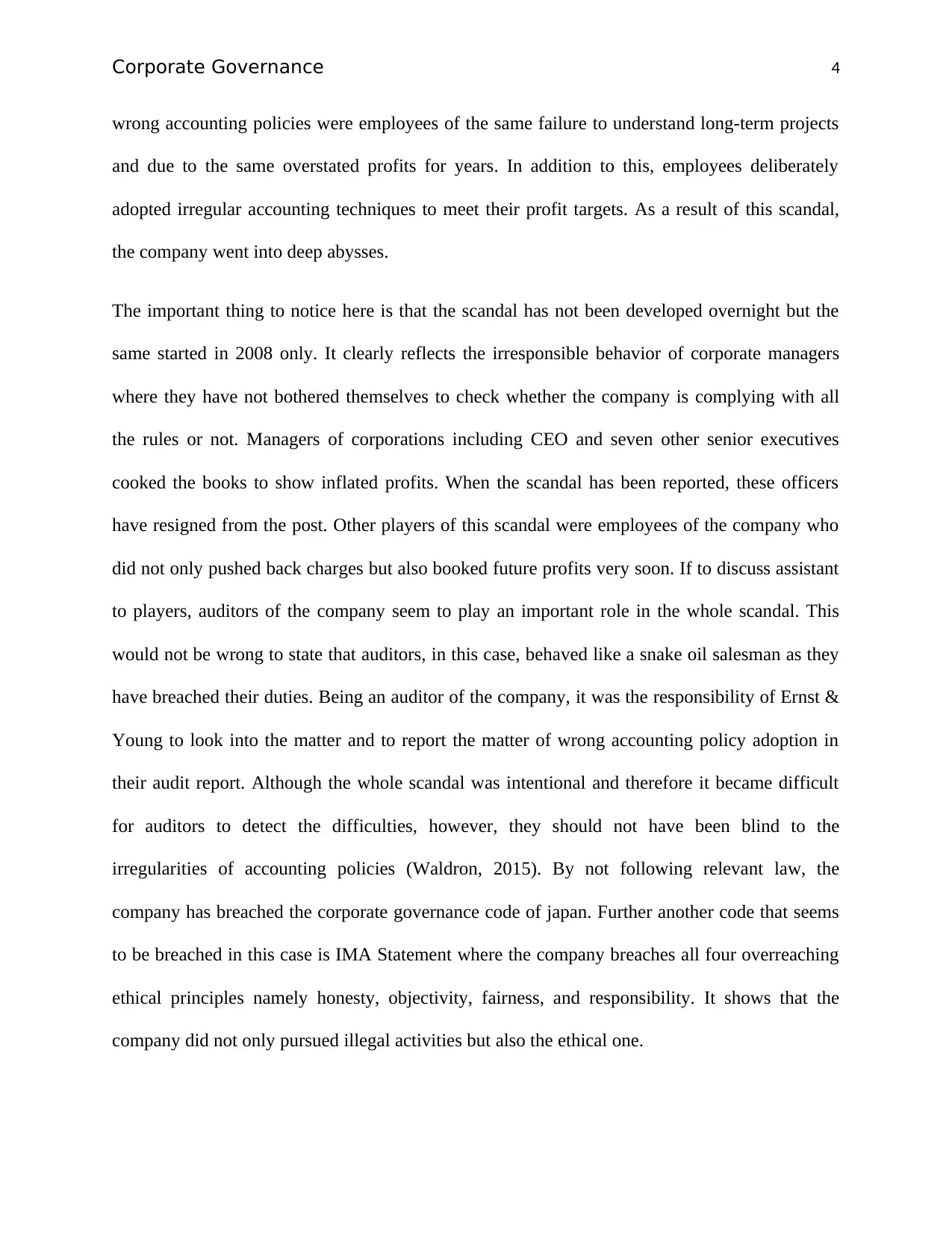
Corporate Governance 4
wrong accounting policies were employees of the same failure to understand long-term projects
and due to the same overstated profits for years. In addition to this, employees deliberately
adopted irregular accounting techniques to meet their profit targets. As a result of this scandal,
the company went into deep abysses.
The important thing to notice here is that the scandal has not been developed overnight but the
same started in 2008 only. It clearly reflects the irresponsible behavior of corporate managers
where they have not bothered themselves to check whether the company is complying with all
the rules or not. Managers of corporations including CEO and seven other senior executives
cooked the books to show inflated profits. When the scandal has been reported, these officers
have resigned from the post. Other players of this scandal were employees of the company who
did not only pushed back charges but also booked future profits very soon. If to discuss assistant
to players, auditors of the company seem to play an important role in the whole scandal. This
would not be wrong to state that auditors, in this case, behaved like a snake oil salesman as they
have breached their duties. Being an auditor of the company, it was the responsibility of Ernst &
Young to look into the matter and to report the matter of wrong accounting policy adoption in
their audit report. Although the whole scandal was intentional and therefore it became difficult
for auditors to detect the difficulties, however, they should not have been blind to the
irregularities of accounting policies (Waldron, 2015). By not following relevant law, the
company has breached the corporate governance code of japan. Further another code that seems
to be breached in this case is IMA Statement where the company breaches all four overreaching
ethical principles namely honesty, objectivity, fairness, and responsibility. It shows that the
company did not only pursued illegal activities but also the ethical one.
wrong accounting policies were employees of the same failure to understand long-term projects
and due to the same overstated profits for years. In addition to this, employees deliberately
adopted irregular accounting techniques to meet their profit targets. As a result of this scandal,
the company went into deep abysses.
The important thing to notice here is that the scandal has not been developed overnight but the
same started in 2008 only. It clearly reflects the irresponsible behavior of corporate managers
where they have not bothered themselves to check whether the company is complying with all
the rules or not. Managers of corporations including CEO and seven other senior executives
cooked the books to show inflated profits. When the scandal has been reported, these officers
have resigned from the post. Other players of this scandal were employees of the company who
did not only pushed back charges but also booked future profits very soon. If to discuss assistant
to players, auditors of the company seem to play an important role in the whole scandal. This
would not be wrong to state that auditors, in this case, behaved like a snake oil salesman as they
have breached their duties. Being an auditor of the company, it was the responsibility of Ernst &
Young to look into the matter and to report the matter of wrong accounting policy adoption in
their audit report. Although the whole scandal was intentional and therefore it became difficult
for auditors to detect the difficulties, however, they should not have been blind to the
irregularities of accounting policies (Waldron, 2015). By not following relevant law, the
company has breached the corporate governance code of japan. Further another code that seems
to be breached in this case is IMA Statement where the company breaches all four overreaching
ethical principles namely honesty, objectivity, fairness, and responsibility. It shows that the
company did not only pursued illegal activities but also the ethical one.
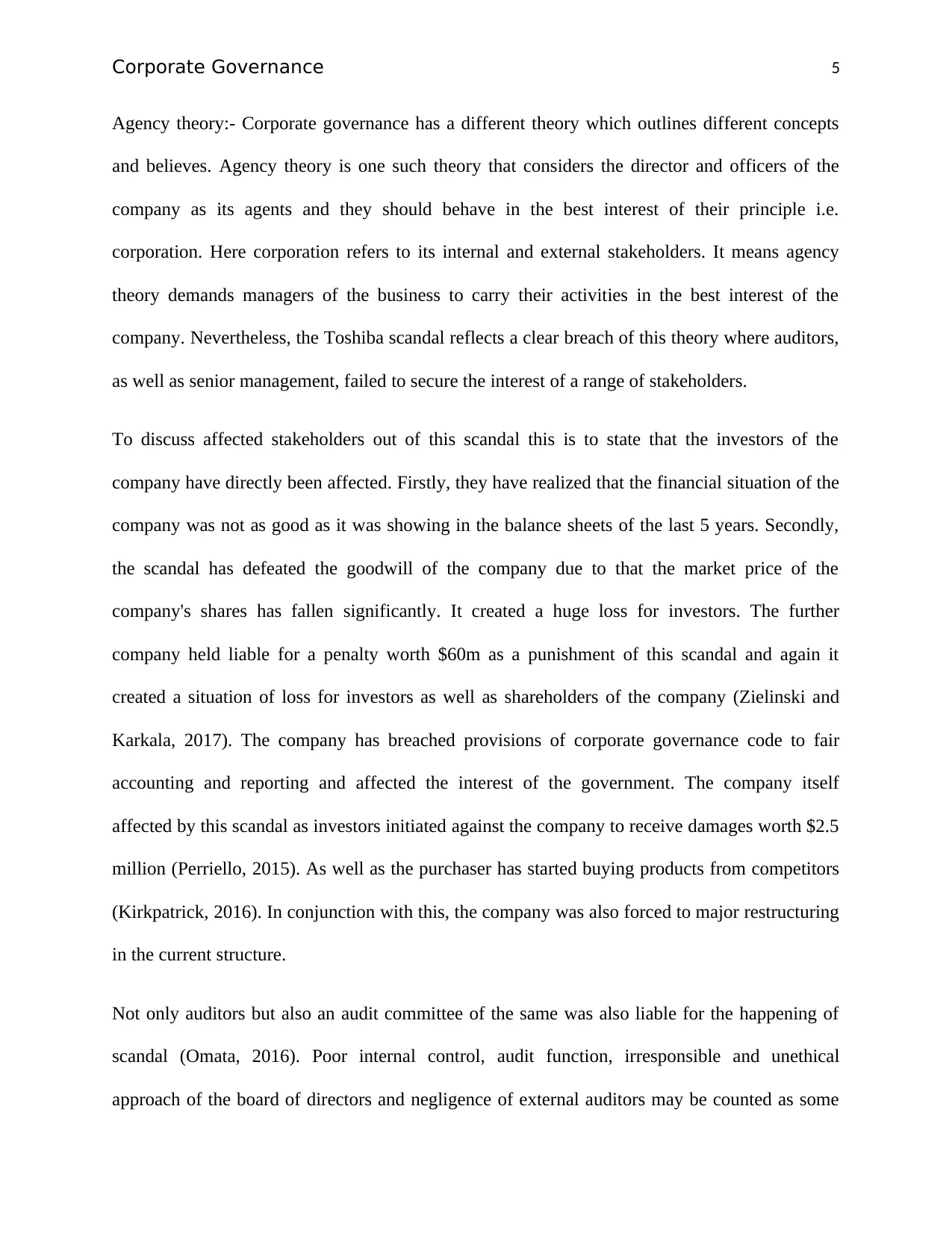
Corporate Governance 5
Agency theory:- Corporate governance has a different theory which outlines different concepts
and believes. Agency theory is one such theory that considers the director and officers of the
company as its agents and they should behave in the best interest of their principle i.e.
corporation. Here corporation refers to its internal and external stakeholders. It means agency
theory demands managers of the business to carry their activities in the best interest of the
company. Nevertheless, the Toshiba scandal reflects a clear breach of this theory where auditors,
as well as senior management, failed to secure the interest of a range of stakeholders.
To discuss affected stakeholders out of this scandal this is to state that the investors of the
company have directly been affected. Firstly, they have realized that the financial situation of the
company was not as good as it was showing in the balance sheets of the last 5 years. Secondly,
the scandal has defeated the goodwill of the company due to that the market price of the
company's shares has fallen significantly. It created a huge loss for investors. The further
company held liable for a penalty worth $60m as a punishment of this scandal and again it
created a situation of loss for investors as well as shareholders of the company (Zielinski and
Karkala, 2017). The company has breached provisions of corporate governance code to fair
accounting and reporting and affected the interest of the government. The company itself
affected by this scandal as investors initiated against the company to receive damages worth $2.5
million (Perriello, 2015). As well as the purchaser has started buying products from competitors
(Kirkpatrick, 2016). In conjunction with this, the company was also forced to major restructuring
in the current structure.
Not only auditors but also an audit committee of the same was also liable for the happening of
scandal (Omata, 2016). Poor internal control, audit function, irresponsible and unethical
approach of the board of directors and negligence of external auditors may be counted as some
Agency theory:- Corporate governance has a different theory which outlines different concepts
and believes. Agency theory is one such theory that considers the director and officers of the
company as its agents and they should behave in the best interest of their principle i.e.
corporation. Here corporation refers to its internal and external stakeholders. It means agency
theory demands managers of the business to carry their activities in the best interest of the
company. Nevertheless, the Toshiba scandal reflects a clear breach of this theory where auditors,
as well as senior management, failed to secure the interest of a range of stakeholders.
To discuss affected stakeholders out of this scandal this is to state that the investors of the
company have directly been affected. Firstly, they have realized that the financial situation of the
company was not as good as it was showing in the balance sheets of the last 5 years. Secondly,
the scandal has defeated the goodwill of the company due to that the market price of the
company's shares has fallen significantly. It created a huge loss for investors. The further
company held liable for a penalty worth $60m as a punishment of this scandal and again it
created a situation of loss for investors as well as shareholders of the company (Zielinski and
Karkala, 2017). The company has breached provisions of corporate governance code to fair
accounting and reporting and affected the interest of the government. The company itself
affected by this scandal as investors initiated against the company to receive damages worth $2.5
million (Perriello, 2015). As well as the purchaser has started buying products from competitors
(Kirkpatrick, 2016). In conjunction with this, the company was also forced to major restructuring
in the current structure.
Not only auditors but also an audit committee of the same was also liable for the happening of
scandal (Omata, 2016). Poor internal control, audit function, irresponsible and unethical
approach of the board of directors and negligence of external auditors may be counted as some
⊘ This is a preview!⊘
Do you want full access?
Subscribe today to unlock all pages.

Trusted by 1+ million students worldwide
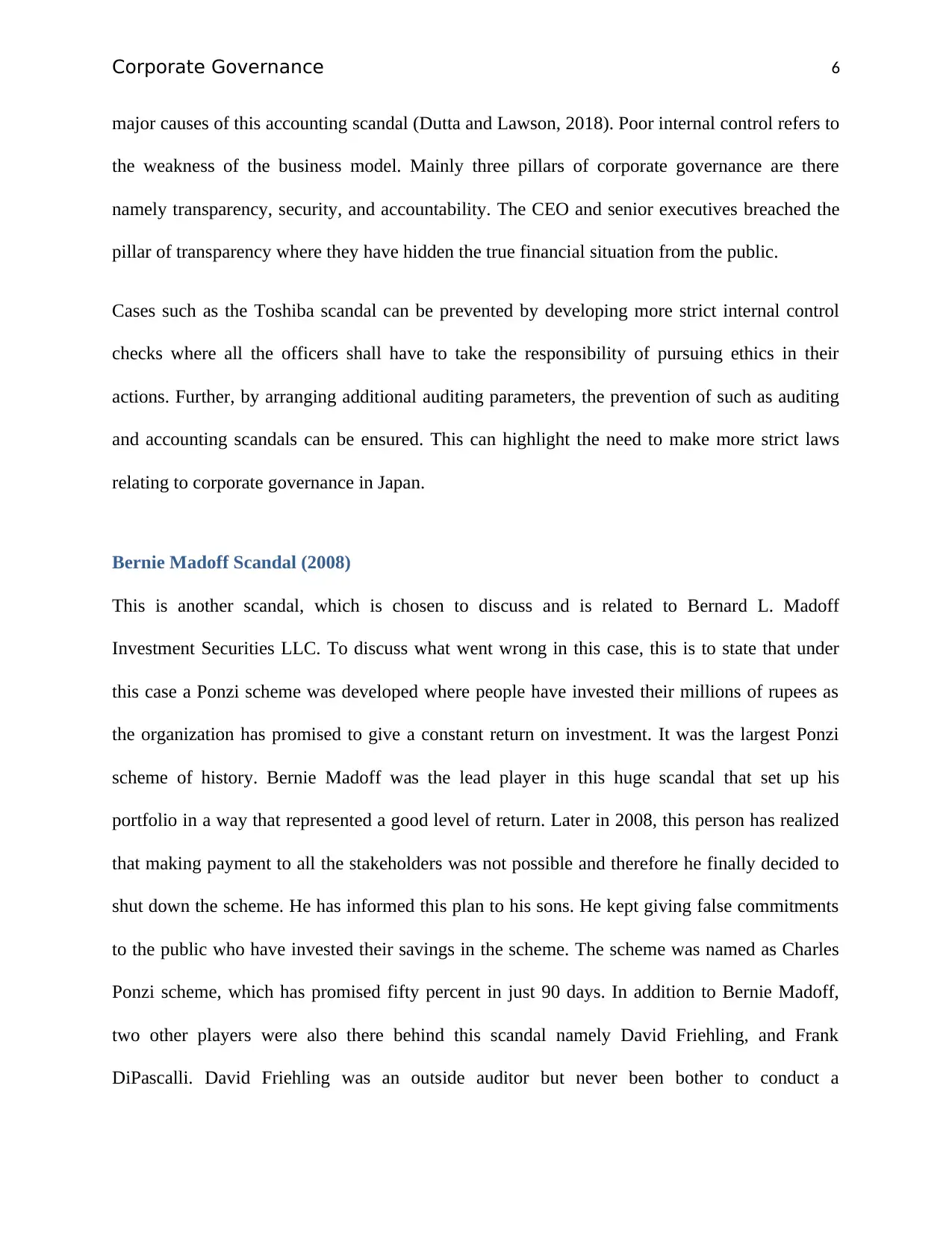
Corporate Governance 6
major causes of this accounting scandal (Dutta and Lawson, 2018). Poor internal control refers to
the weakness of the business model. Mainly three pillars of corporate governance are there
namely transparency, security, and accountability. The CEO and senior executives breached the
pillar of transparency where they have hidden the true financial situation from the public.
Cases such as the Toshiba scandal can be prevented by developing more strict internal control
checks where all the officers shall have to take the responsibility of pursuing ethics in their
actions. Further, by arranging additional auditing parameters, the prevention of such as auditing
and accounting scandals can be ensured. This can highlight the need to make more strict laws
relating to corporate governance in Japan.
Bernie Madoff Scandal (2008)
This is another scandal, which is chosen to discuss and is related to Bernard L. Madoff
Investment Securities LLC. To discuss what went wrong in this case, this is to state that under
this case a Ponzi scheme was developed where people have invested their millions of rupees as
the organization has promised to give a constant return on investment. It was the largest Ponzi
scheme of history. Bernie Madoff was the lead player in this huge scandal that set up his
portfolio in a way that represented a good level of return. Later in 2008, this person has realized
that making payment to all the stakeholders was not possible and therefore he finally decided to
shut down the scheme. He has informed this plan to his sons. He kept giving false commitments
to the public who have invested their savings in the scheme. The scheme was named as Charles
Ponzi scheme, which has promised fifty percent in just 90 days. In addition to Bernie Madoff,
two other players were also there behind this scandal namely David Friehling, and Frank
DiPascalli. David Friehling was an outside auditor but never been bother to conduct a
major causes of this accounting scandal (Dutta and Lawson, 2018). Poor internal control refers to
the weakness of the business model. Mainly three pillars of corporate governance are there
namely transparency, security, and accountability. The CEO and senior executives breached the
pillar of transparency where they have hidden the true financial situation from the public.
Cases such as the Toshiba scandal can be prevented by developing more strict internal control
checks where all the officers shall have to take the responsibility of pursuing ethics in their
actions. Further, by arranging additional auditing parameters, the prevention of such as auditing
and accounting scandals can be ensured. This can highlight the need to make more strict laws
relating to corporate governance in Japan.
Bernie Madoff Scandal (2008)
This is another scandal, which is chosen to discuss and is related to Bernard L. Madoff
Investment Securities LLC. To discuss what went wrong in this case, this is to state that under
this case a Ponzi scheme was developed where people have invested their millions of rupees as
the organization has promised to give a constant return on investment. It was the largest Ponzi
scheme of history. Bernie Madoff was the lead player in this huge scandal that set up his
portfolio in a way that represented a good level of return. Later in 2008, this person has realized
that making payment to all the stakeholders was not possible and therefore he finally decided to
shut down the scheme. He has informed this plan to his sons. He kept giving false commitments
to the public who have invested their savings in the scheme. The scheme was named as Charles
Ponzi scheme, which has promised fifty percent in just 90 days. In addition to Bernie Madoff,
two other players were also there behind this scandal namely David Friehling, and Frank
DiPascalli. David Friehling was an outside auditor but never been bother to conduct a
Paraphrase This Document
Need a fresh take? Get an instant paraphrase of this document with our AI Paraphraser
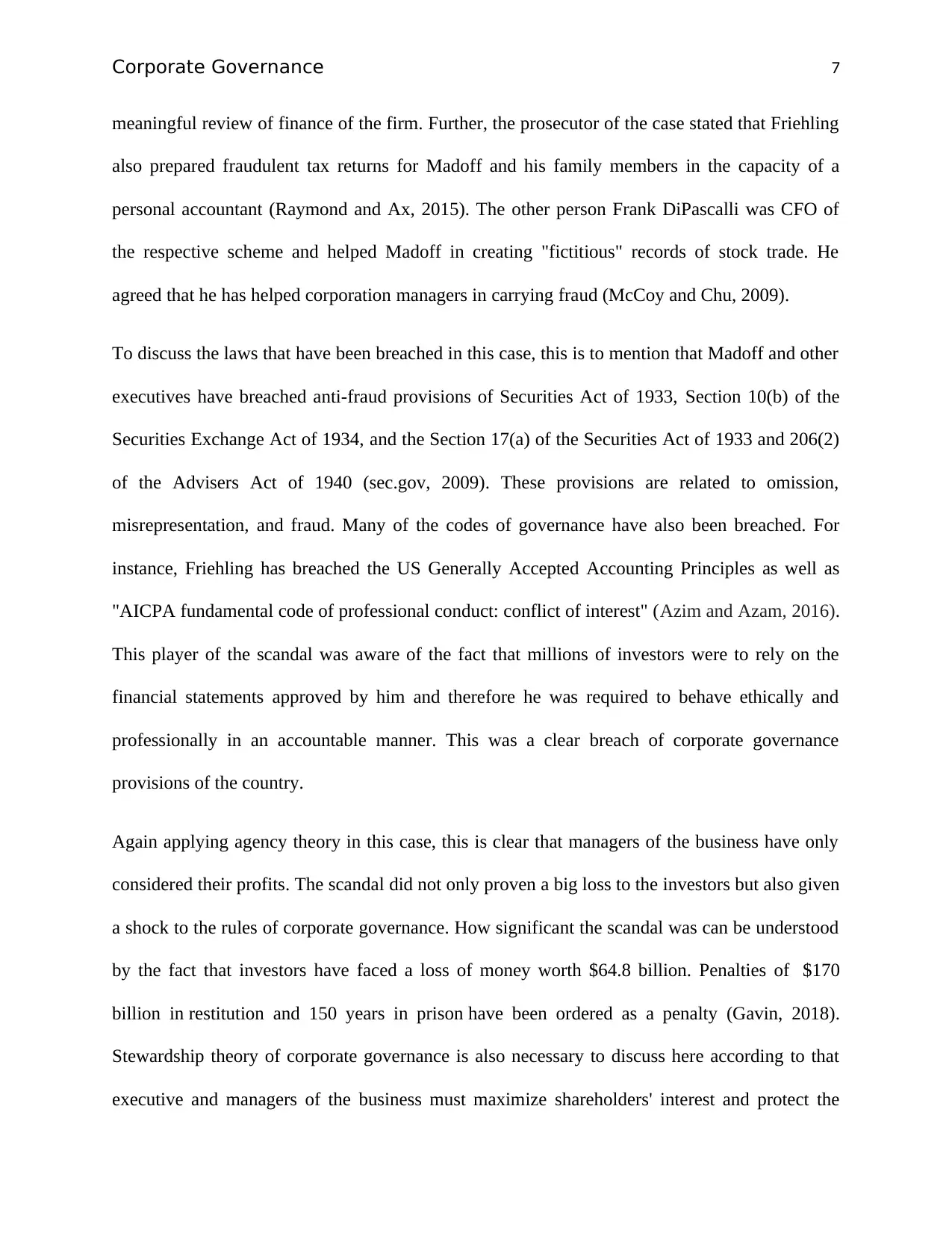
Corporate Governance 7
meaningful review of finance of the firm. Further, the prosecutor of the case stated that Friehling
also prepared fraudulent tax returns for Madoff and his family members in the capacity of a
personal accountant (Raymond and Ax, 2015). The other person Frank DiPascalli was CFO of
the respective scheme and helped Madoff in creating "fictitious" records of stock trade. He
agreed that he has helped corporation managers in carrying fraud (McCoy and Chu, 2009).
To discuss the laws that have been breached in this case, this is to mention that Madoff and other
executives have breached anti-fraud provisions of Securities Act of 1933, Section 10(b) of the
Securities Exchange Act of 1934, and the Section 17(a) of the Securities Act of 1933 and 206(2)
of the Advisers Act of 1940 (sec.gov, 2009). These provisions are related to omission,
misrepresentation, and fraud. Many of the codes of governance have also been breached. For
instance, Friehling has breached the US Generally Accepted Accounting Principles as well as
"AICPA fundamental code of professional conduct: conflict of interest" (Azim and Azam, 2016).
This player of the scandal was aware of the fact that millions of investors were to rely on the
financial statements approved by him and therefore he was required to behave ethically and
professionally in an accountable manner. This was a clear breach of corporate governance
provisions of the country.
Again applying agency theory in this case, this is clear that managers of the business have only
considered their profits. The scandal did not only proven a big loss to the investors but also given
a shock to the rules of corporate governance. How significant the scandal was can be understood
by the fact that investors have faced a loss of money worth $64.8 billion. Penalties of $170
billion in restitution and 150 years in prison have been ordered as a penalty (Gavin, 2018).
Stewardship theory of corporate governance is also necessary to discuss here according to that
executive and managers of the business must maximize shareholders' interest and protect the
meaningful review of finance of the firm. Further, the prosecutor of the case stated that Friehling
also prepared fraudulent tax returns for Madoff and his family members in the capacity of a
personal accountant (Raymond and Ax, 2015). The other person Frank DiPascalli was CFO of
the respective scheme and helped Madoff in creating "fictitious" records of stock trade. He
agreed that he has helped corporation managers in carrying fraud (McCoy and Chu, 2009).
To discuss the laws that have been breached in this case, this is to mention that Madoff and other
executives have breached anti-fraud provisions of Securities Act of 1933, Section 10(b) of the
Securities Exchange Act of 1934, and the Section 17(a) of the Securities Act of 1933 and 206(2)
of the Advisers Act of 1940 (sec.gov, 2009). These provisions are related to omission,
misrepresentation, and fraud. Many of the codes of governance have also been breached. For
instance, Friehling has breached the US Generally Accepted Accounting Principles as well as
"AICPA fundamental code of professional conduct: conflict of interest" (Azim and Azam, 2016).
This player of the scandal was aware of the fact that millions of investors were to rely on the
financial statements approved by him and therefore he was required to behave ethically and
professionally in an accountable manner. This was a clear breach of corporate governance
provisions of the country.
Again applying agency theory in this case, this is clear that managers of the business have only
considered their profits. The scandal did not only proven a big loss to the investors but also given
a shock to the rules of corporate governance. How significant the scandal was can be understood
by the fact that investors have faced a loss of money worth $64.8 billion. Penalties of $170
billion in restitution and 150 years in prison have been ordered as a penalty (Gavin, 2018).
Stewardship theory of corporate governance is also necessary to discuss here according to that
executive and managers of the business must maximize shareholders' interest and protect the
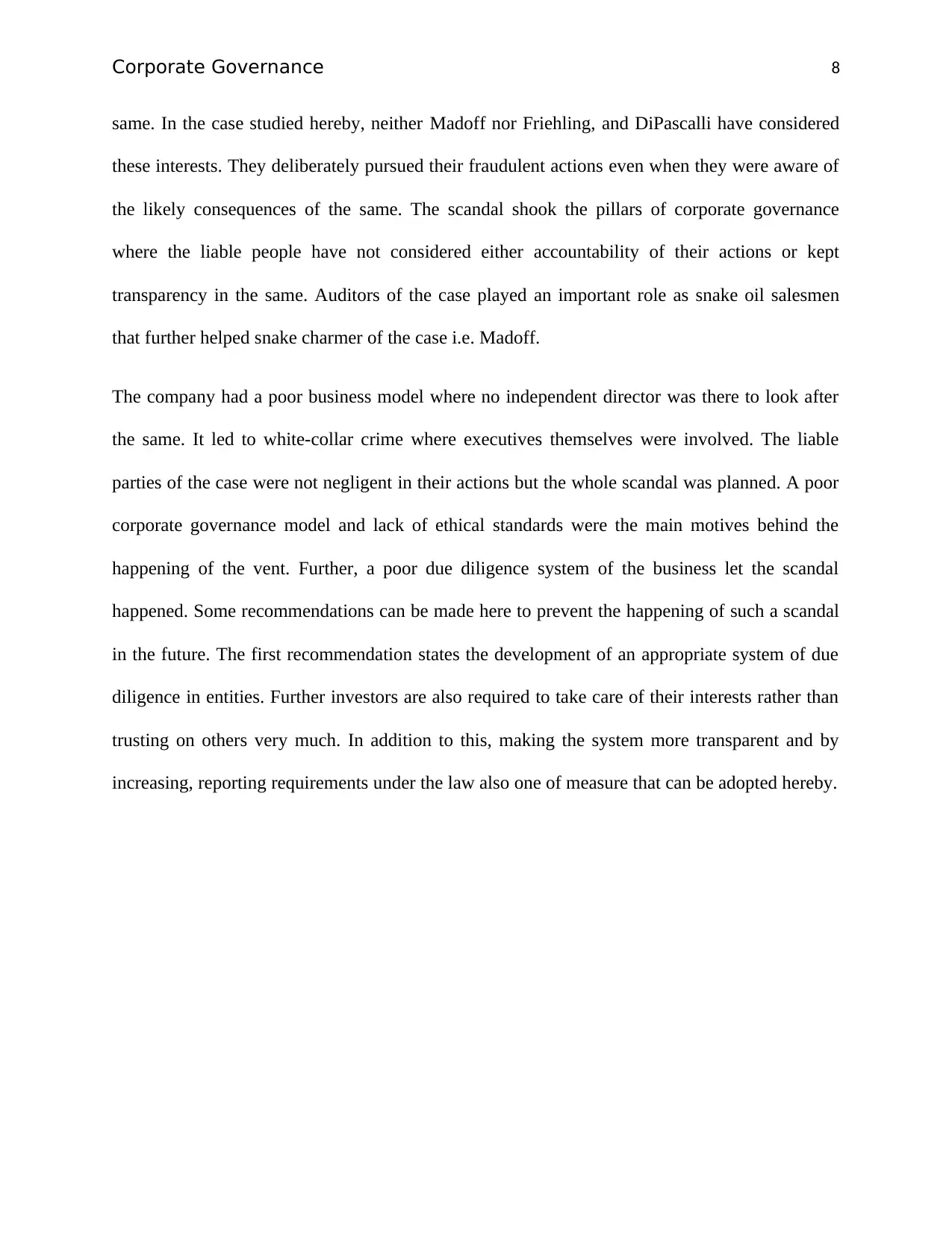
Corporate Governance 8
same. In the case studied hereby, neither Madoff nor Friehling, and DiPascalli have considered
these interests. They deliberately pursued their fraudulent actions even when they were aware of
the likely consequences of the same. The scandal shook the pillars of corporate governance
where the liable people have not considered either accountability of their actions or kept
transparency in the same. Auditors of the case played an important role as snake oil salesmen
that further helped snake charmer of the case i.e. Madoff.
The company had a poor business model where no independent director was there to look after
the same. It led to white-collar crime where executives themselves were involved. The liable
parties of the case were not negligent in their actions but the whole scandal was planned. A poor
corporate governance model and lack of ethical standards were the main motives behind the
happening of the vent. Further, a poor due diligence system of the business let the scandal
happened. Some recommendations can be made here to prevent the happening of such a scandal
in the future. The first recommendation states the development of an appropriate system of due
diligence in entities. Further investors are also required to take care of their interests rather than
trusting on others very much. In addition to this, making the system more transparent and by
increasing, reporting requirements under the law also one of measure that can be adopted hereby.
same. In the case studied hereby, neither Madoff nor Friehling, and DiPascalli have considered
these interests. They deliberately pursued their fraudulent actions even when they were aware of
the likely consequences of the same. The scandal shook the pillars of corporate governance
where the liable people have not considered either accountability of their actions or kept
transparency in the same. Auditors of the case played an important role as snake oil salesmen
that further helped snake charmer of the case i.e. Madoff.
The company had a poor business model where no independent director was there to look after
the same. It led to white-collar crime where executives themselves were involved. The liable
parties of the case were not negligent in their actions but the whole scandal was planned. A poor
corporate governance model and lack of ethical standards were the main motives behind the
happening of the vent. Further, a poor due diligence system of the business let the scandal
happened. Some recommendations can be made here to prevent the happening of such a scandal
in the future. The first recommendation states the development of an appropriate system of due
diligence in entities. Further investors are also required to take care of their interests rather than
trusting on others very much. In addition to this, making the system more transparent and by
increasing, reporting requirements under the law also one of measure that can be adopted hereby.
⊘ This is a preview!⊘
Do you want full access?
Subscribe today to unlock all pages.

Trusted by 1+ million students worldwide
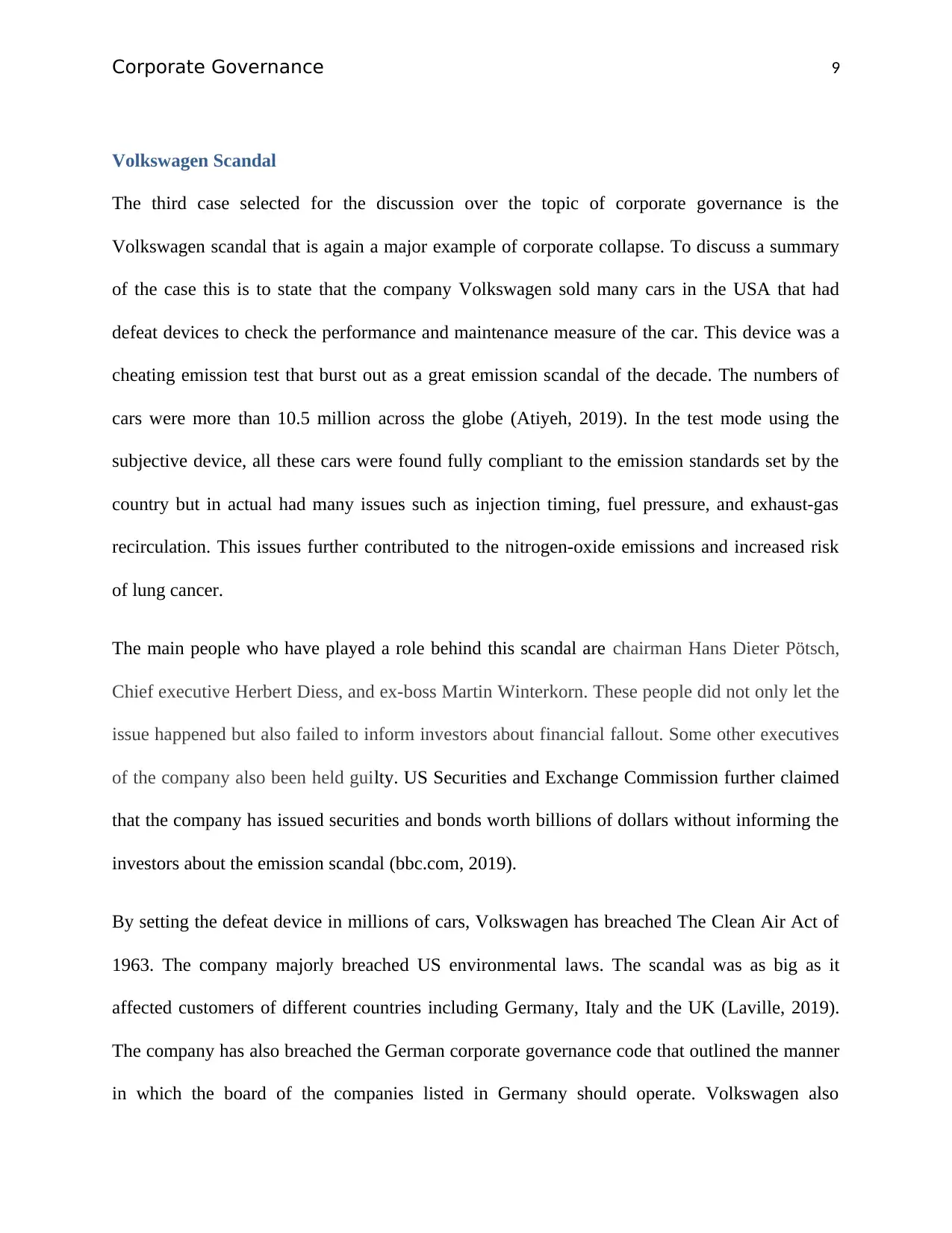
Corporate Governance 9
Volkswagen Scandal
The third case selected for the discussion over the topic of corporate governance is the
Volkswagen scandal that is again a major example of corporate collapse. To discuss a summary
of the case this is to state that the company Volkswagen sold many cars in the USA that had
defeat devices to check the performance and maintenance measure of the car. This device was a
cheating emission test that burst out as a great emission scandal of the decade. The numbers of
cars were more than 10.5 million across the globe (Atiyeh, 2019). In the test mode using the
subjective device, all these cars were found fully compliant to the emission standards set by the
country but in actual had many issues such as injection timing, fuel pressure, and exhaust-gas
recirculation. This issues further contributed to the nitrogen-oxide emissions and increased risk
of lung cancer.
The main people who have played a role behind this scandal are chairman Hans Dieter Pötsch,
Chief executive Herbert Diess, and ex-boss Martin Winterkorn. These people did not only let the
issue happened but also failed to inform investors about financial fallout. Some other executives
of the company also been held guilty. US Securities and Exchange Commission further claimed
that the company has issued securities and bonds worth billions of dollars without informing the
investors about the emission scandal (bbc.com, 2019).
By setting the defeat device in millions of cars, Volkswagen has breached The Clean Air Act of
1963. The company majorly breached US environmental laws. The scandal was as big as it
affected customers of different countries including Germany, Italy and the UK (Laville, 2019).
The company has also breached the German corporate governance code that outlined the manner
in which the board of the companies listed in Germany should operate. Volkswagen also
Volkswagen Scandal
The third case selected for the discussion over the topic of corporate governance is the
Volkswagen scandal that is again a major example of corporate collapse. To discuss a summary
of the case this is to state that the company Volkswagen sold many cars in the USA that had
defeat devices to check the performance and maintenance measure of the car. This device was a
cheating emission test that burst out as a great emission scandal of the decade. The numbers of
cars were more than 10.5 million across the globe (Atiyeh, 2019). In the test mode using the
subjective device, all these cars were found fully compliant to the emission standards set by the
country but in actual had many issues such as injection timing, fuel pressure, and exhaust-gas
recirculation. This issues further contributed to the nitrogen-oxide emissions and increased risk
of lung cancer.
The main people who have played a role behind this scandal are chairman Hans Dieter Pötsch,
Chief executive Herbert Diess, and ex-boss Martin Winterkorn. These people did not only let the
issue happened but also failed to inform investors about financial fallout. Some other executives
of the company also been held guilty. US Securities and Exchange Commission further claimed
that the company has issued securities and bonds worth billions of dollars without informing the
investors about the emission scandal (bbc.com, 2019).
By setting the defeat device in millions of cars, Volkswagen has breached The Clean Air Act of
1963. The company majorly breached US environmental laws. The scandal was as big as it
affected customers of different countries including Germany, Italy and the UK (Laville, 2019).
The company has also breached the German corporate governance code that outlined the manner
in which the board of the companies listed in Germany should operate. Volkswagen also
Paraphrase This Document
Need a fresh take? Get an instant paraphrase of this document with our AI Paraphraser
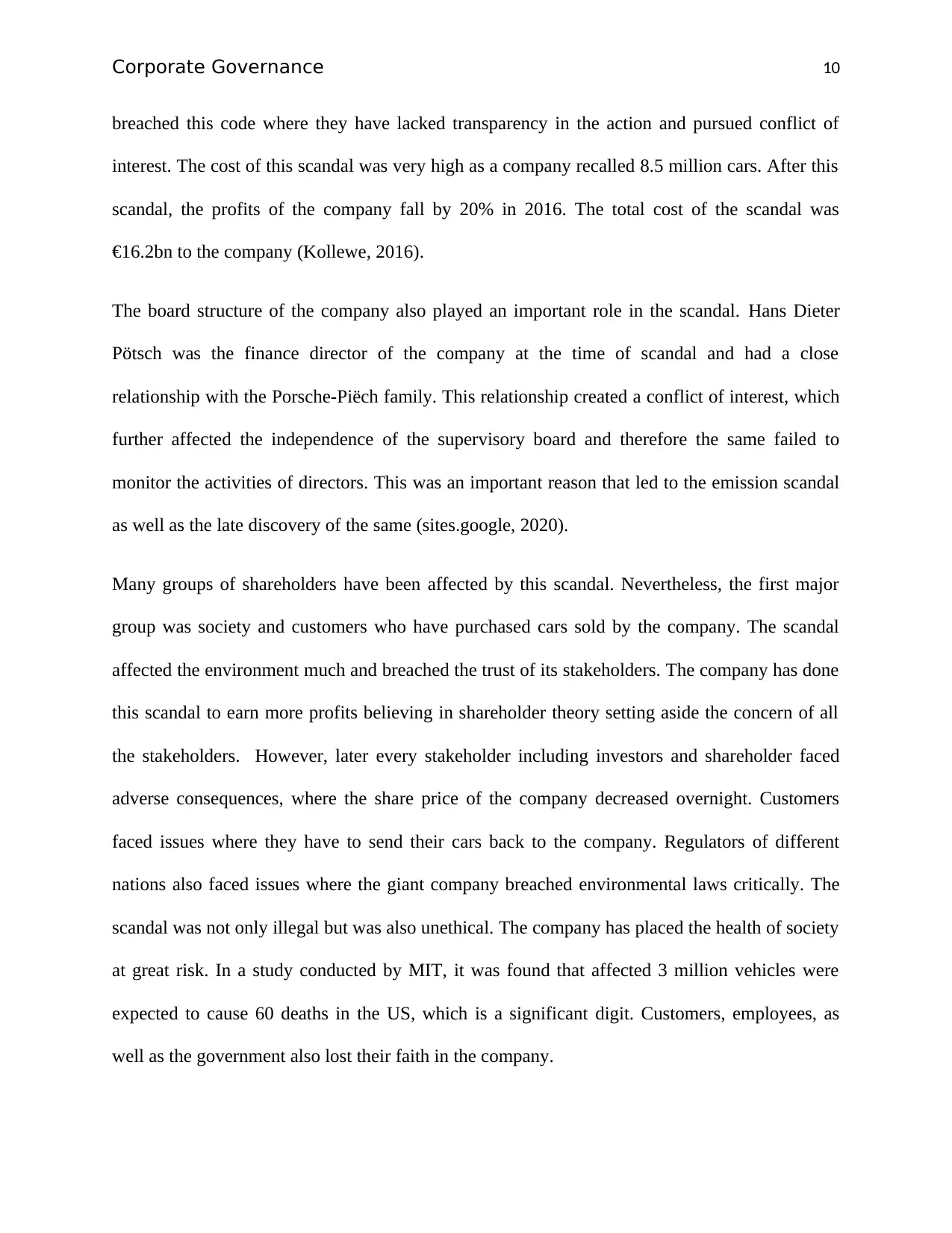
Corporate Governance 10
breached this code where they have lacked transparency in the action and pursued conflict of
interest. The cost of this scandal was very high as a company recalled 8.5 million cars. After this
scandal, the profits of the company fall by 20% in 2016. The total cost of the scandal was
€16.2bn to the company (Kollewe, 2016).
The board structure of the company also played an important role in the scandal. Hans Dieter
Pötsch was the finance director of the company at the time of scandal and had a close
relationship with the Porsche-Piëch family. This relationship created a conflict of interest, which
further affected the independence of the supervisory board and therefore the same failed to
monitor the activities of directors. This was an important reason that led to the emission scandal
as well as the late discovery of the same (sites.google, 2020).
Many groups of shareholders have been affected by this scandal. Nevertheless, the first major
group was society and customers who have purchased cars sold by the company. The scandal
affected the environment much and breached the trust of its stakeholders. The company has done
this scandal to earn more profits believing in shareholder theory setting aside the concern of all
the stakeholders. However, later every stakeholder including investors and shareholder faced
adverse consequences, where the share price of the company decreased overnight. Customers
faced issues where they have to send their cars back to the company. Regulators of different
nations also faced issues where the giant company breached environmental laws critically. The
scandal was not only illegal but was also unethical. The company has placed the health of society
at great risk. In a study conducted by MIT, it was found that affected 3 million vehicles were
expected to cause 60 deaths in the US, which is a significant digit. Customers, employees, as
well as the government also lost their faith in the company.
breached this code where they have lacked transparency in the action and pursued conflict of
interest. The cost of this scandal was very high as a company recalled 8.5 million cars. After this
scandal, the profits of the company fall by 20% in 2016. The total cost of the scandal was
€16.2bn to the company (Kollewe, 2016).
The board structure of the company also played an important role in the scandal. Hans Dieter
Pötsch was the finance director of the company at the time of scandal and had a close
relationship with the Porsche-Piëch family. This relationship created a conflict of interest, which
further affected the independence of the supervisory board and therefore the same failed to
monitor the activities of directors. This was an important reason that led to the emission scandal
as well as the late discovery of the same (sites.google, 2020).
Many groups of shareholders have been affected by this scandal. Nevertheless, the first major
group was society and customers who have purchased cars sold by the company. The scandal
affected the environment much and breached the trust of its stakeholders. The company has done
this scandal to earn more profits believing in shareholder theory setting aside the concern of all
the stakeholders. However, later every stakeholder including investors and shareholder faced
adverse consequences, where the share price of the company decreased overnight. Customers
faced issues where they have to send their cars back to the company. Regulators of different
nations also faced issues where the giant company breached environmental laws critically. The
scandal was not only illegal but was also unethical. The company has placed the health of society
at great risk. In a study conducted by MIT, it was found that affected 3 million vehicles were
expected to cause 60 deaths in the US, which is a significant digit. Customers, employees, as
well as the government also lost their faith in the company.
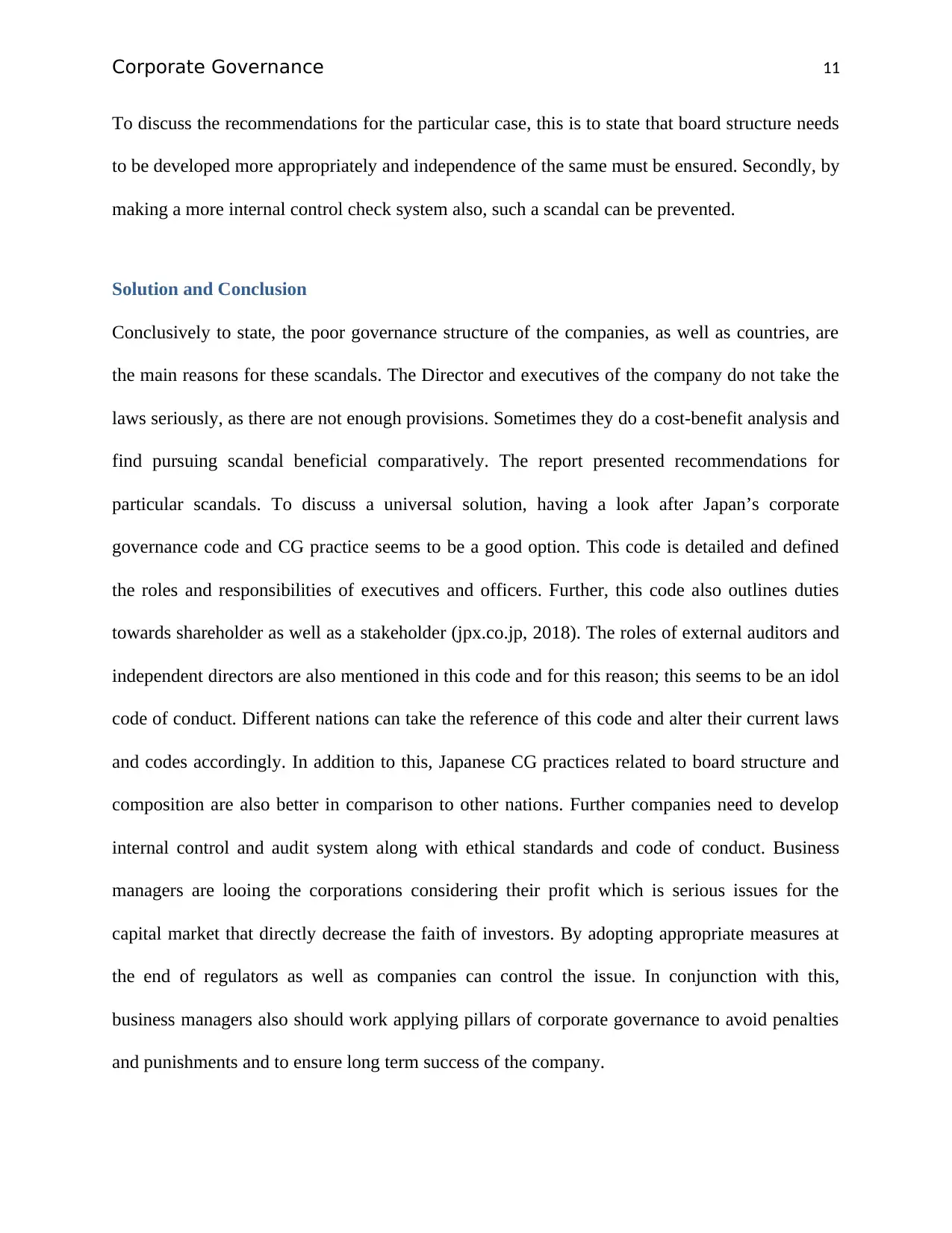
Corporate Governance 11
To discuss the recommendations for the particular case, this is to state that board structure needs
to be developed more appropriately and independence of the same must be ensured. Secondly, by
making a more internal control check system also, such a scandal can be prevented.
Solution and Conclusion
Conclusively to state, the poor governance structure of the companies, as well as countries, are
the main reasons for these scandals. The Director and executives of the company do not take the
laws seriously, as there are not enough provisions. Sometimes they do a cost-benefit analysis and
find pursuing scandal beneficial comparatively. The report presented recommendations for
particular scandals. To discuss a universal solution, having a look after Japan’s corporate
governance code and CG practice seems to be a good option. This code is detailed and defined
the roles and responsibilities of executives and officers. Further, this code also outlines duties
towards shareholder as well as a stakeholder (jpx.co.jp, 2018). The roles of external auditors and
independent directors are also mentioned in this code and for this reason; this seems to be an idol
code of conduct. Different nations can take the reference of this code and alter their current laws
and codes accordingly. In addition to this, Japanese CG practices related to board structure and
composition are also better in comparison to other nations. Further companies need to develop
internal control and audit system along with ethical standards and code of conduct. Business
managers are looing the corporations considering their profit which is serious issues for the
capital market that directly decrease the faith of investors. By adopting appropriate measures at
the end of regulators as well as companies can control the issue. In conjunction with this,
business managers also should work applying pillars of corporate governance to avoid penalties
and punishments and to ensure long term success of the company.
To discuss the recommendations for the particular case, this is to state that board structure needs
to be developed more appropriately and independence of the same must be ensured. Secondly, by
making a more internal control check system also, such a scandal can be prevented.
Solution and Conclusion
Conclusively to state, the poor governance structure of the companies, as well as countries, are
the main reasons for these scandals. The Director and executives of the company do not take the
laws seriously, as there are not enough provisions. Sometimes they do a cost-benefit analysis and
find pursuing scandal beneficial comparatively. The report presented recommendations for
particular scandals. To discuss a universal solution, having a look after Japan’s corporate
governance code and CG practice seems to be a good option. This code is detailed and defined
the roles and responsibilities of executives and officers. Further, this code also outlines duties
towards shareholder as well as a stakeholder (jpx.co.jp, 2018). The roles of external auditors and
independent directors are also mentioned in this code and for this reason; this seems to be an idol
code of conduct. Different nations can take the reference of this code and alter their current laws
and codes accordingly. In addition to this, Japanese CG practices related to board structure and
composition are also better in comparison to other nations. Further companies need to develop
internal control and audit system along with ethical standards and code of conduct. Business
managers are looing the corporations considering their profit which is serious issues for the
capital market that directly decrease the faith of investors. By adopting appropriate measures at
the end of regulators as well as companies can control the issue. In conjunction with this,
business managers also should work applying pillars of corporate governance to avoid penalties
and punishments and to ensure long term success of the company.
⊘ This is a preview!⊘
Do you want full access?
Subscribe today to unlock all pages.

Trusted by 1+ million students worldwide
1 out of 15
Related Documents
Your All-in-One AI-Powered Toolkit for Academic Success.
+13062052269
info@desklib.com
Available 24*7 on WhatsApp / Email
![[object Object]](/_next/static/media/star-bottom.7253800d.svg)
Unlock your academic potential
Copyright © 2020–2026 A2Z Services. All Rights Reserved. Developed and managed by ZUCOL.





